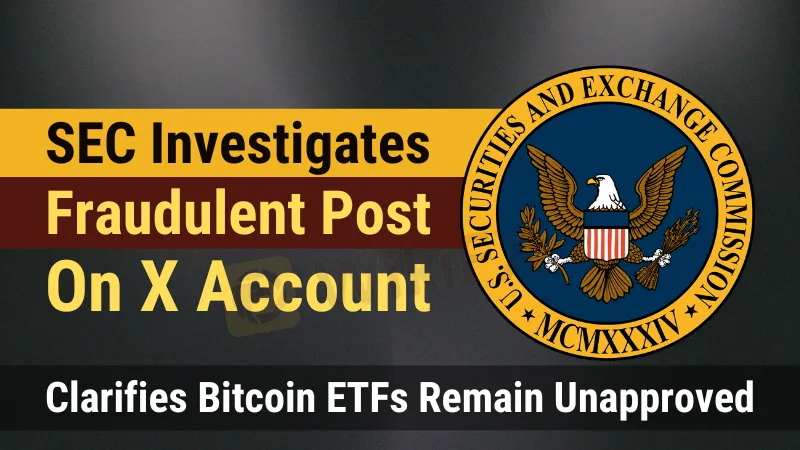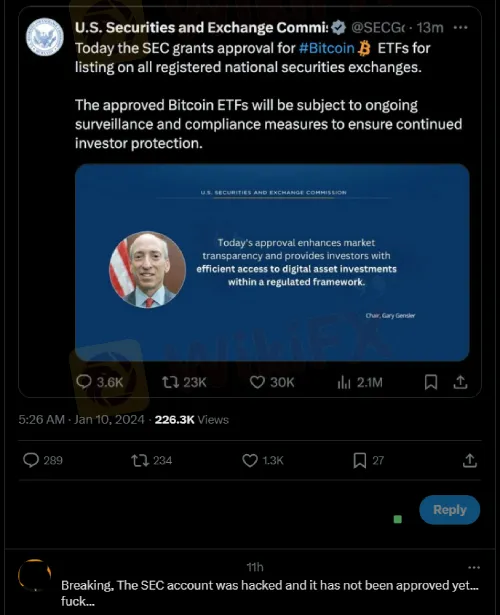简体中文
繁體中文
English
Pусский
日本語
ภาษาไทย
Tiếng Việt
Bahasa Indonesia
Español
हिन्दी
Filippiiniläinen
Français
Deutsch
Português
Türkçe
한국어
العربية
SEC Investigates Fraudulent Post on X Account, Clarifies Bitcoin ETFs Remain Unapproved
Abstract:SEC clarifies no approval for Bitcoin ETFs after a fraudulent post on X platform; investigation underway on the security breach.

A brief intrusion was reported on the X social media platform by a U.S. securities regulator on Tuesday. The intruder disseminated a fraudulent message purporting to authorize exchange-traded funds (ETFs) for Bitcoin, a development that the cryptocurrency industry had enthusiastically anticipated.
At approximately 4 p.m. Eastern time (2100 GMT), the Securities and Exchange Commission (SEC) disclosed that it has not yet approved spot bitcoin ETFs. Additionally, the SEC's account on X, formerly Twitter, was momentarily compromised by an unidentified entity. The agency stated that “unauthorized access has been terminated.”
Law enforcement will be collaborated with to investigate the breach and “related conduct,” according to the SEC.
X affirmed late Tuesday that the SEC's account had been compromised and stated that it was due to a third party granting an “unidentified individual” access to a phone number associated with the agency's account.

Citing an initial investigation, the social media platform owned by Elon Musk also stated that the SEC had not enabled two-factor authentication at the time the account was compromised and that the breach was not the result of a breach of X's systems.
The fraudulent publication claimed to contain a quotation from SEC Chair Gary Gensler and stated that the SEC had authorized bitcoin ETFs on all registered national securities exchanges. It also boasted an accompanying image. The post, which was taken up by Reuters and other news outlets that monitor the SEC's account, caused an increase in the price of bitcoin.

The SEC was widely anticipated to approve a set of ETFs that monitor the price of bitcoin on Wednesday, marking a potential turning point for the cryptocurrency industry. The posting coincided with this anticipation. Industry insiders scrambled to determine whether the unauthorized post was genuine and why the SEC would initially publish something on social media.
Executives of some ETF issuers expressed shock and astonishment at the initial tweet, speaking on the condition of anonymity due to the sensitivity of the matter.
As a consequence of the breach, one executive expressed “concern” that the SEC might delay or withhold approval for spot bitcoin ETFs.
It was initially unclear, according to two issuers who requested anonymity, whether the breach would affect the approval schedule for spot bitcoin ETFs. Wednesday is the anticipated date of the SEC's judgment regarding a joint proposal put forth by Ark Investments and 21Shares.
Attorney Anthony Tu-Sekine, chief of the blockchain and cryptocurrency division at Seward & Kissel in Washington, stated that at this late juncture, he did not believe the incident would affect the likelihood of approvals.
Tu-Sekine stated that it was puzzling as to why an individual would take such a course of action when the endorsement was already widely anticipated. “This is puzzling,” stated Tu-Sekine.
SPIKE IN PRICE STORM
The post on the SEC's X account had garnered a minimum of one million views as of 4:11 p.m. ET. After less than twenty minutes, it ceased to be visible and seemed to have been removed.

The fictitious statement caused the price of Bitcoin to surge to approximately $48,000, before plummeting to below $45,000 minutes later. It was last trading at $45,513 after the SEC disowned and deleted the information, a decrease of 3.15%. Certain analysts had anticipated a decline in bitcoin in response to the ETF approvals, given that the cryptocurrency had risen by over 70% in recent months on the anticipation of a greenlight.
The SEC declined to comment on whether an investigation into the compromise has begun or whether potential approvals will be impacted as a result of the incident. In the past, the SEC has rejected every spot bitcoin ETF proposal on account of concerns regarding market manipulation.
Similar to other social media platforms, X accounts are occasionally compromised through the theft of passwords or the deception of targets into divulging their login credentials.
Additionally, accounts may be compromised through a breach of the social media platform itself. An adolescent hacker and his companions, for instance, breached X's internal computer network in 2020 and acquired control of dozens of prominent accounts to promote a cryptocurrency hoax.
Affected at the time were accounts associated with Elon Musk, Barack Obama, Kim Kardashian, and Jeff Bezos, among others.
A request for comment was not met with a response from a representative of X.
“To stay informed about global affairs, we have become reliant on this instant social media sensation,” said James Angel, an associate professor at the McDonough School of Business at Georgetown University. “We're going to be more and more vulnerable to this kind of instant misinformation.”

Disclaimer:
The views in this article only represent the author's personal views, and do not constitute investment advice on this platform. This platform does not guarantee the accuracy, completeness and timeliness of the information in the article, and will not be liable for any loss caused by the use of or reliance on the information in the article.
Read more

MultiBank Group Wins Big at Traders Fair Hong Kong 2024
Discover how MultiBank Group, a global leader in financial derivatives, secured three prestigious awards at Traders Fair Hong Kong 2024, highlighting its innovative trading solutions and industry excellence.

CySEC Settles Compliance Case with Fxview Operator Charlgate Ltd
Discover how CySEC resolved compliance issues with Charlgate Ltd, the operator of Fxview, through a €50,000 settlement. Explore the investigation, regulatory measures, and CySEC's new website designed for improved accessibility and transparency.

TradingView Launches Liquidity Analysis Tool DEX Screener
Discover TradingView's DEX Screener, a powerful tool for analyzing decentralized exchange trading pairs. Access metrics like liquidity, trading volume, and FDV to make smarter, data-driven trading decisions.

What Are The Common Types of Unregulated Forex Brokers?
Protect your investments from unregulated forex brokers with these tips. Learn about red flags, scams, and how the WikiFX app ensures safe trading experiences worldwide.
WikiFX Broker
Latest News
Volkswagen agrees deal to avoid Germany plant closures
Geopolitical Events: What They Are & Their Impact?
Top 10 Trading Indicators Every Forex Trader Should Know
TradingView Launches Liquidity Analysis Tool DEX Screener
MultiBank Group Wins Big at Traders Fair Hong Kong 2024
WikiEXPO Global Expert Interview: Simone Martin—— Exploring Financial Regulation Change
'Young investors make investment decisions impulsively to keep up with current trends' FCA Reveals
Why Do You Feel Scared During Trade Execution?
CySEC Settles Compliance Case with Fxview Operator Charlgate Ltd
Malaysian Influencer Detained in Taiwan Over Alleged Role in Fraud Scheme
Currency Calculator


